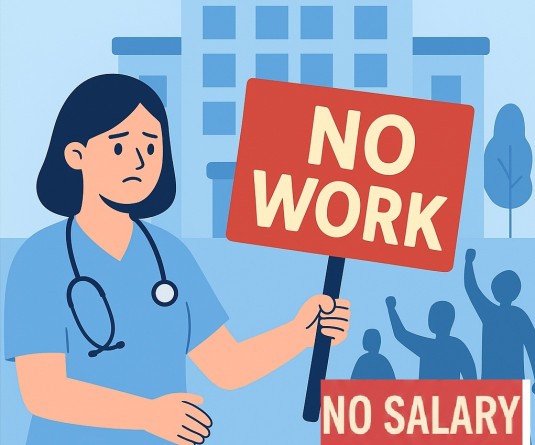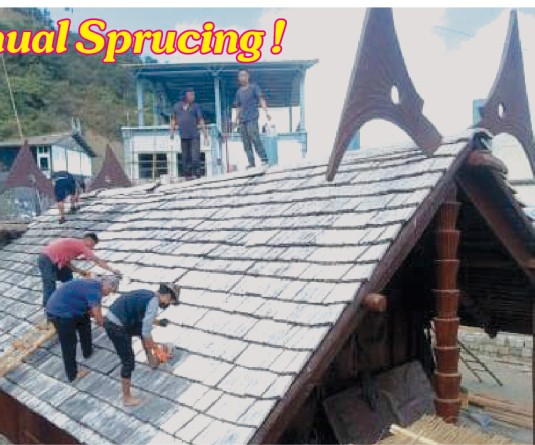A view of Dimapur with its usual bustle of vehicles and people. With rising COVID-19 cases, the State Government has declared most of Dimapur and Kohima as containment zones. (Morung File Photo)
.jpg)
7 day restriction on movement and activities from 7:00pm of May 5
DIMAPUR, MAY 3 (MExN): The Nagaland Government has declared most areas in Dimapur and Kohima as containment zones in view of the increasing number of COVID-19 cases in the State.
The containment zones include all areas under the Dimapur Municipal Council, Chümoukedima Town Council, colonies/villages along Dimapur-Chümoukedima four lane road, Kohima Municipal Council and New Capital Complex Kohima.
The Home Department issued an order imposing restriction on movement and activities in the said areas for 7 days beginning 7:00pm of May 5.
What is allowed
• Movement of goods vehicles including vehicles carrying oxygen/cylinders and other medical equipment.
• All healthcare facilities including animal healthcare, hospitals, clinics and nursing homes.
• All pharmacies including those selling veterinary medicines.
• Construction activities.
• Agri and allied activities.
• Funeral services, limited to not more than 20 persons.
• Dimapur airport to remain open and movement of staff & passengers allowed.
Movement of people
• Exemptions for: Officers & staff working in district administration, police, security forces, Fire & Emergency Services, Home Department, Medical, Postal Service, NIC, NSDMA, Home Guards & Civil Defence, SDRF, Power, PHED, Food & Civil Supplies, Finance, Treasury & Accounts, Banks/ATMs, IT&C, IPR, AIR, Doordarshan, all personnel relating to electronic & print media, telecom and internet service providers, food/grocery delivery service providers.
• Movement of private passenger vehicles allowed to ply on odd-even system with 50% occupancy.
• Public transport vehicles like buses, taxis, autos, 2 wheeler taxis etc allowed to ply with 50% occupancy.
• Only 25% of such public transport vehicles in the district allowed to ply in a day. DTFs to issue modalities.
Businesses & shops
• Petrol pumps to remain open as usual while ensuring there is no crowding.
• All vegetable, fish, meat vendors, milk booths may remain open from 6:00am to 2:00pm.
• Hotels for lodging allowed to remain open with minimal staff.
• Restaurants to remain closed for in house dining. They may cater through takeaway and home delivery.
• Small stand alone shops in colonies allowed to open subject to regulation by respective ward/colony authority.
Religious places
• All mass gatherings are to be closed including religious places, except for solemnization of weddings with prior permission of the Deputy Commissioner.
All other activities and movement of persons except the ones cited above will be suspended during the period.
Meanwhile, the Administrative Heads of Departments, Heads of Departments and Heads of Offices have been directed to form a core group of officers in their departments to attend to urgent and essential matters including court cases who shall attend office. All other government employees should be available on call, the order stated.
The districts, blocks and areas which do not fall under the containment zones can continue their activities as per the guidelines issued by the State Government on April 29. The order further stated that the ‘night curfew’ imposed by DTFs may continue.
The Home Department directed that these measures should be enforced strictly by the DTFs with strict checking to prevent non essential movement of persons.
Centre and State govts may consider imposing lockdown: SC
New Delhi, May 3 (PTI): Concerned over surge in COVID-19 cases in the country, the Supreme Court said the Centre and state governments may consider imposing a lockdown to curb the virus in the second wave in the interest of public welfare .
However, the apex court put a caveat before them saying if they decide to go for lockdown then arrangements must be made beforehand to cater to the needs of the poor people.
A bench headed by Justice D Y Chandrachud, in its order passed in the suo motu case for ensuring essential supplies and services during the COVID-19 pandemic, also asked the Centre and state governments to put on record the efforts taken and to be taken by them in future to ensure that the disease does not spread further.
In a 64-page order uploaded on the apex court’s website late Sunday night, the bench, also comprising justices L Nagesara Rao and S Ravindra Bhat, said, In light of the continuing surge of infections in the second wave of the pandemic, we direct the Central Government and State Governments to put on record the efforts taken to curb the spread of the virus and the measures that they plan on taking in the near future.
At the same time, we would seriously urge the Central and State Governments to consider imposing a ban on mass gatherings and super spreader events.
They may also consider imposing a lockdown to curb the virus in the second wave in the interest of public welfare, Justice Chandrachud, writing the order for the bench, said.
The apex court said that it was cognizant of the socio-economic impact of a lockdown , specifically, on the marginalized communities.
Thus, in case the measure of a lockdown is imposed, arrangements must be made beforehand to cater to the needs of these communities, it said.
The bench on April 22 had taken note of the pandemic situation due to sudden surge in COVID-19 cases as also in mortality and said it expected the Centre to come out with a national plan to deal with the distribution of essential services and supplies, including oxygen and drugs.
India, in last 24 hours, recorded 3,68,147 new COVID-19 cases and taking the cumulative tally to 1,99,25, 604.






